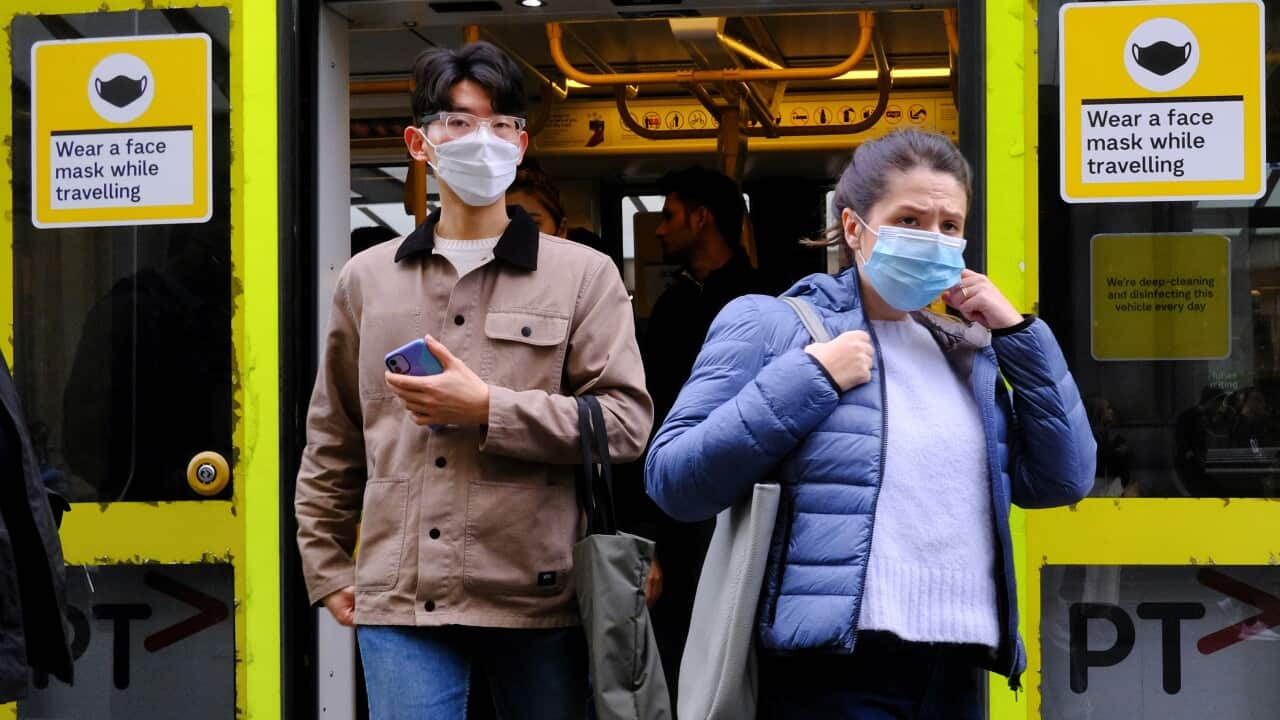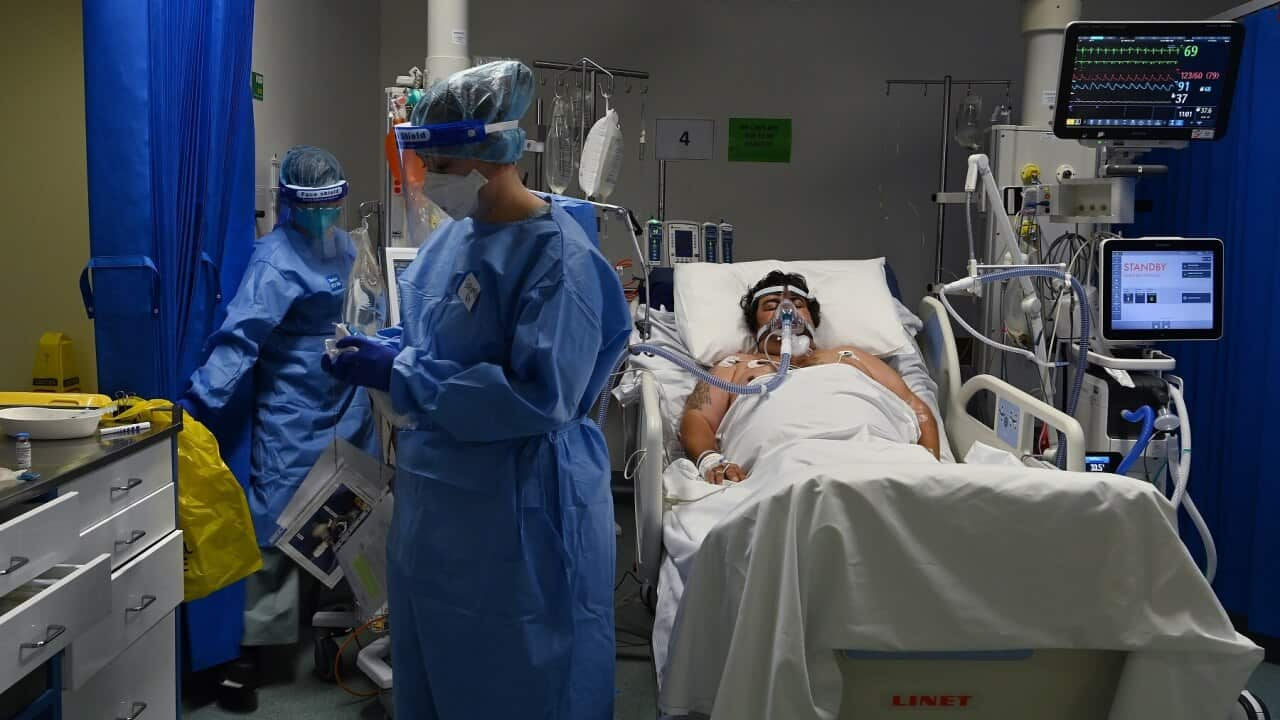Key Points
- Masks to protect against COVID-19 are only mandated in certain settings in Australia
- Studies show wearing a mask could reduce the risk of infection by up to 83 per cent
Health authorities no longer force people in Australia to wear face masks except in certain situations, but previous studies show how effective wearing a mask can be in stopping you from getting COVID-19.
From around February this year, most states and territories gradually removed requirements for people to wear face masks except in limited circumstances. Current mandates vary slightly across jurisdictions but masks are generally still required while travelling on public transport and planes, and when in hospitals and aged care centres.
The requirement for people to wear masks in airport terminals was removed after the Australian Health Protection Principal Committee (AHPPC) said in June it was no longer appropriate. The decision whether or not to wear a mask in most public indoor spaces such as shopping centres and in offices is now down to individual choice.

Wearing a mask can reduce your risk of getting COVID. Source: AAP
Victorian Chief Health Officer Brett Sutton told reporters on Friday: "The public health recommendation was to consider a mandate, but it is for the minister to make pandemic orders with consideration of all of those other inputs that she receives."
The health advice to continue wearing masks reflects studies that show it could reduce the risk of infection by between 11 per cent and 83 per cent, depending on the mask used.
Professor Sutton said Australia was clearly dealing with another COVID-19 wave driven by subvariants BA.4 and BA.5, which are more able to avoid the protective effects of previous COVID-19 infections or vaccinations.
"We are in a COVID soup right now — there's a lot of transmission around."
We are in a COVID soup right now — there's a lot of transmission around.- Brett Sutton, Victorian Chief Health Officer
While Professor Sutton acknowledged mixed findings around whether mandates led to a significant increase in mask-wearing, he said there was "one view" among the top experts that masks did help stop transmission.
"There is one view among public health experts in Australia, among all chief health officers, the chief medical officer federally, the CDC [US Centers for Disease Control and Prevention], the WHO [World Health Organisation], the European CDC, the public health association in Canada," Professor Sutton said.

Victorian Chief Health Officer Brett Sutton says it's clear masks stop the transmission of COVID-19. Source: AAP
How masks can help reduce infection
A California study conducted last year found people who said they always wore any type of mask or respirator in indoor public spaces were 56 per cent less likely to test positive for COVID-19, compared to those who said they never wore them.
The study, published in February in the US CDC's , underwent an internal peer review process.
It looked at the habits of 652 COVID-positive people and compared them to 1,176 people who had tested negative. Among the 534 participants who were able to tell researchers what type of face mask they wore, those who said they used N95/KN95 respirators were found to be 83 per cent less likely to test positive.
Others who wore surgical masks were 66 per cent less likely to test positive. Wearing a cloth mask also appeared to lower the odds of a positive test but the result was not statistically significant.
"Using a respirator offers the highest level of protection from acquisition of SARS-CoV-2 infection, although it is most important to wear a well-fitting mask or respirator that is comfortable and can be used consistently," the study said.
Infectious diseases expert Professor Peter Collignon of Australian National University, noted there were limitations to the study.

Professor Peter Collignon of ANU Medical School Source: SBS News
He said there was still ongoing debate about whether N95 masks were better than surgical masks at decreasing infections, and more research was needed. But he noted other prospective studies — in which researchers observe and follow participants over a period of time — had shown mask wearing in general could lower the risk of catching COVID by around 15 per cent.
This includes a peer-reviewed study conducted by Yale and Stanford researchers in Bangladesh in May 2020, and published in the journal in December last year. This study involved observers handing out surgical masks and promoting their use to people in some rural villages. COVID-19 rates in these areas were compared to other villages where this intervention did not occur.
The study found the use of masks tripled in villages where they were encouraged, and this also reduced COVID-19 rates in these areas. Reports of COVID-19 symptoms and confirmed cases were around 11.6 per cent lower.
"Villages where in-person reinforcement of mask-wearing occurred ... showed a reduction in reporting COVID-like illness, particularly in high-risk individuals," the study states.
Among those aged over 60 years old, the study found mask wearing may have reduced reports of symptomatic COVID-19 cases by up to 35.3 per cent.
More than 300,000 people completed symptom surveys as part of the study, with around 178,000 of these from villages where masks were encouraged. Around one-third of participants agreed to blood tests to confirm a COVID-19 infection.

Surgical masks have been shown to lower transmission of COVID. Source: Getty / Getty Images
"Also, it decreases your chance of giving it to others," he said.
But he pointed out that most COVID-19 transmissions appeared to happen in the home, or in places such as gyms, bars, clubs and pubs, where people don't usually wear masks.
"Hence I think we should promote mask use indoors in crowded situations but not mandate them because it is difficult to show mandates have made a huge difference over the last year."
Both the California and Bangladesh studies were also completed prior to the explosion of cases caused by the more infectious Omicron variant.
Masks only part of the solution
Deakin University epidemiologist Catherine Bennett said COVID-19 had become so widespread it was almost impossible to avoid being exposed to the virus, but using a mask could create a physical barrier, which could reduce the amount of virus particles entering someone's system.
Professor Bennett said mask studies were very complex and engineering studies often showed mixed results. The California study was based on real-life experience but she said masking was likely only part of the story.
"The people that actually choose to wear the mask are probably also distancing and doing hygiene and other things," she said.
Professor Bennett said a distance barrier could be created by choosing to sit in the outdoor area of a cafe, and an immune barrier could also be erected through vaccination, which would allow somebody to potentially launch a faster immune response, defeating the infection before it really got started.
"You might still be exposed to the virus but your immune system has a chance to fight it off."
She said wearing a mask, getting vaccinated, social distancing and good hygiene measures could all reduce the chance of testing positive even if you were exposed.
"[Making] those decisions reduce the risk — not of exposure — because you can't really control that now, but of that exposure converting into an infection," she said.
"I don't think just putting on a mask is enough and I certainly don't think it replaces vaccines, but it's a really important part of the mix."
Despite the lack of enforcement, Australia's Chief Medical Officer Professor Paul Kelly has urged Australians to continue wearing masks.
"We know that wearing masks do reduce the spread and protect yourself or protect others if you're away from home and indoors in a crowded place," he told reporters on 19 July.
"I really, very strongly suggest that you do wear masks."
There are and health authorities believe the true number could be much higher. State authorities have also warned Australians they could be at risk of catching COVID-19 in as little as one month after recovering from an infection.
This month the Australian Technical Advisory Group on Immunisation (ATAGI) released new advice that adults aged 50 to 64 should get a fourth vaccine dose as a winter booster.
Younger people aged 30 and 49 can also get a winter booster but ATAGI noted the benefit for this age group was less certain as they were already less susceptible to severe disease.
Would you like to share your story with SBS News? Email












